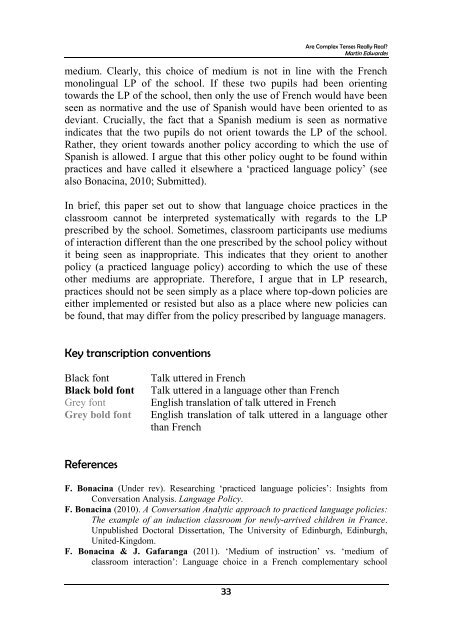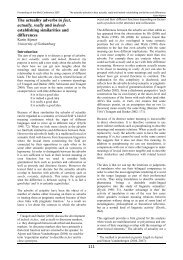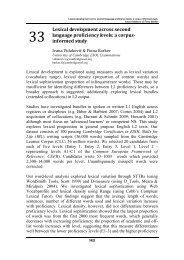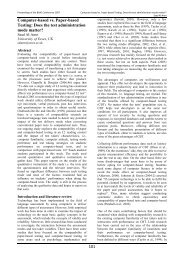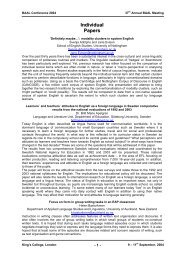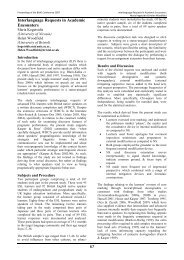Proceedings of the - British Association for Applied Linguistics
Proceedings of the - British Association for Applied Linguistics
Proceedings of the - British Association for Applied Linguistics
Create successful ePaper yourself
Turn your PDF publications into a flip-book with our unique Google optimized e-Paper software.
33<br />
Are Complex Tenses Really Real?<br />
Martin Edwardes<br />
medium. Clearly, this choice <strong>of</strong> medium is not in line with <strong>the</strong> French<br />
monolingual LP <strong>of</strong> <strong>the</strong> school. If <strong>the</strong>se two pupils had been orienting<br />
towards <strong>the</strong> LP <strong>of</strong> <strong>the</strong> school, <strong>the</strong>n only <strong>the</strong> use <strong>of</strong> French would have been<br />
seen as normative and <strong>the</strong> use <strong>of</strong> Spanish would have been oriented to as<br />
deviant. Crucially, <strong>the</strong> fact that a Spanish medium is seen as normative<br />
indicates that <strong>the</strong> two pupils do not orient towards <strong>the</strong> LP <strong>of</strong> <strong>the</strong> school.<br />
Ra<strong>the</strong>r, <strong>the</strong>y orient towards ano<strong>the</strong>r policy according to which <strong>the</strong> use <strong>of</strong><br />
Spanish is allowed. I argue that this o<strong>the</strong>r policy ought to be found within<br />
practices and have called it elsewhere a ‘practiced language policy’ (see<br />
also Bonacina, 2010; Submitted).<br />
In brief, this paper set out to show that language choice practices in <strong>the</strong><br />
classroom cannot be interpreted systematically with regards to <strong>the</strong> LP<br />
prescribed by <strong>the</strong> school. Sometimes, classroom participants use mediums<br />
<strong>of</strong> interaction different than <strong>the</strong> one prescribed by <strong>the</strong> school policy without<br />
it being seen as inappropriate. This indicates that <strong>the</strong>y orient to ano<strong>the</strong>r<br />
policy (a practiced language policy) according to which <strong>the</strong> use <strong>of</strong> <strong>the</strong>se<br />
o<strong>the</strong>r mediums are appropriate. There<strong>for</strong>e, I argue that in LP research,<br />
practices should not be seen simply as a place where top-down policies are<br />
ei<strong>the</strong>r implemented or resisted but also as a place where new policies can<br />
be found, that may differ from <strong>the</strong> policy prescribed by language managers.<br />
Key transcription conventions<br />
Black font Talk uttered in French<br />
Black bold font Talk uttered in a language o<strong>the</strong>r than French<br />
Grey font English translation <strong>of</strong> talk uttered in French<br />
Grey bold font English translation <strong>of</strong> talk uttered in a language o<strong>the</strong>r<br />
than French<br />
References<br />
F. Bonacina (Under rev). Researching ‘practiced language policies’: Insights from<br />
Conversation Analysis. Language Policy.<br />
F. Bonacina (2010). A Conversation Analytic approach to practiced language policies:<br />
The example <strong>of</strong> an induction classroom <strong>for</strong> newly-arrived children in France.<br />
Unpublished Doctoral Dissertation, The University <strong>of</strong> Edinburgh, Edinburgh,<br />
United-Kingdom.<br />
F. Bonacina & J. Gafaranga (2011). ‘Medium <strong>of</strong> instruction’ vs. ‘medium <strong>of</strong><br />
classroom interaction’: Language choice in a French complementary school


